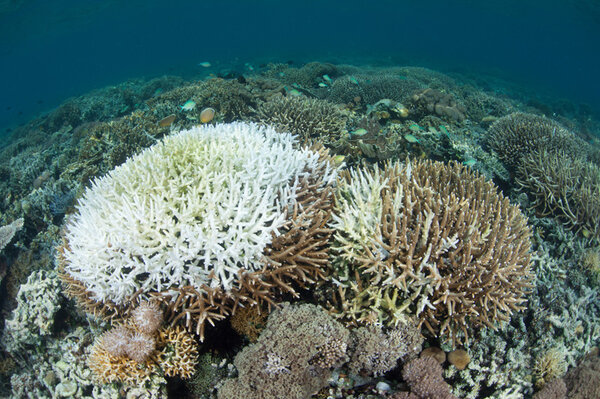Expertise
Impact on the fishing sector and aquaculture
In collaboration with Cambridge University, the Thünen Institute of Sea Fisheries has summarized important key findings on fisheries management and aquaculture found in the IPCC Assessment Report.
Climate change affects the physical and chemical properties of the oceans. In addition to warming, the increased uptake of CO2 leads to ocean acidification. This has direct consequences for fish, shellfish and other marine organisms. Ocean acidification affects coral growth and represents a threat to the survival of endangered reefs. Coral bleaching events are likely to increase. Additionally, calcareous shells of mollusks, such as mussels and oysters, become thinner. Since the beginning of industrialization, the average pH of the oceans has already fallen 0.1. This change means that seawater has become acidic by about 30%. By 2100, a further decrease of 0.3 to 0.4 is expected; the pH of seawater was not so low for at least 50 million years. When water is warmed, it can absorb less oxygen, having as possible consequences: The maximum length that large fishes can reach decreases; the number of coastal regions with low-oxygen waters increases; regions in the ocean where oxygen content is depleted for natural reasons spread.
For the fishing industry, the impact of climate change worldwide is considered to be most likely negative. Fish stocks will shift regionally. Corresponding changes have already an impact on the composition of fish catches. With further global warming, many species will keep migrating polewards. Some forecasts indicate that biodiversity and fishing catch potential will increase on average in mid and high latitudes and will decrease in tropical latitudes. Such changes are likely to affect the means of existence in tropical developing countries (for instance, of artisanal fishermen). In the inter-tidal zones of the North Pacific and the North Atlantic, the habitats of many species have shifted as much as 50 km per decade. This can be a major threat to marine food webs. Changes in resources in coastal regions and the resulting food insecurity for the people living there can cause more illegal, unreported and unregulated fishing (IUU).
Aquaculture could be affected if not enough feed for fish can be caught. Mortality of aquaculture shellfish will increase because of ocean acidification. Brackish and freshwater aquaculture farms that keep their animals in ponds and lagoons are particularly at risk in low-latitude tropical coastal areas. Risks include storm surges, intrusion of salty sea water due to rising sea levels and flooding caused by stronger rains. However, climate change may also have positive aspects for aquaculture: These include rapid growth of the breeding animals, more efficient utilization of feed, longer breeding periods, larger areas of distribution of species or an expansion of farming areas due to sea-ice decline.
Options for action
There are a number of ways to help fisheries and aquaculture to adapt to climate change. For example, shellfish farmers in the northwest of the USA deal with ocean acidification by interrupting the fresh water supply when the pH drops below a certain level. In the short term, it will be possible to adapt to some effects of climate change, for instance through better administration, management and monitoring of fish stocks. The reduction of non-climatic stresses (like littering the environment) could help to limit the effects of climate change. At the technical level, measures with which fishermen are already familiar could be used. Selective fishing equipment, which is continually being developed, could help avoiding fishing vulnerable species. The development of new fishing areas could be planned on the basis of expected climatic changes and taking into account sustainability and nature conservation – instead of on short-term, as it has being done until now. Above all, both the fishing industry and governments could agree on expanding particularly sustainable aquacultures to compensate for losses in wild-caught fish and shellfish.
This and other public information can be found on the website of the Cambridge Institute for Sustainability Leadership (Cambridge University): http://www.cisl.cam.ac.uk/business-action/low-carbon-transformation/ipcc-climate-science-business-briefings/fisheries-and-aquaculture.







